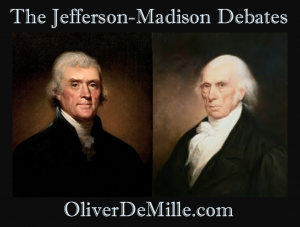Jefferson-Madison Debates: Mobs, Mobs, Everywhere
October 24th, 2018 // 7:31 pm @ Oliver DeMille
Rising Emotions, Rising Problems
 If you’ve watched the news recently, you’ve seen a lot of protestors. They protest policies. Proposed policies. People. Statues. History. Elected officials. Nominated officials. The police. Men. Women. Business and University heads. Visiting speakers. Other races. Other religions. Government officers having dinner with a spouse. The national anthem. Wall Street. Bill Clinton. George Bush. Barack Obama. Donald Trump. Obamacare. The latest war. The list goes on and on.
If you’ve watched the news recently, you’ve seen a lot of protestors. They protest policies. Proposed policies. People. Statues. History. Elected officials. Nominated officials. The police. Men. Women. Business and University heads. Visiting speakers. Other races. Other religions. Government officers having dinner with a spouse. The national anthem. Wall Street. Bill Clinton. George Bush. Barack Obama. Donald Trump. Obamacare. The latest war. The list goes on and on.
When the Left agrees with something a big protest is promoting, they frequently call it a Peaceful Protest, even if the reality is a bit less than “peaceful”. If they disagree with the group, like during the height of Tea Party demonstrations, they call it a Mob. The Right often does the same thing–Peaceful Protests if they agree, Mobs if they don’t.
Of course mobs, demonstrations, and protests have been around a long time. In ancient Greece, they were seen as the most dangerous threat to any established government. In modern-day Europe, they frequently take on a highly violent tone–at times moving from Protests to full-blown Riots in just minutes. And who can forget the symbolic power of great protests in history, like students gunned down at Kent State, or the man who stayed in front of the tank in Tienanmen Square and put his own life on the line for change?
But are mobs, or protests, effective? Do they typically achieve the things the marchers want? Indeed, do they ever really obtain the stated goals? Tienanmen Tank-Man isn’t running China today, the Tea Parties didn’t get Obamacare repealed or Obama to scale down his rhetoric. Trump isn’t caving in to protestors either, and the Supreme Court is made by elected officials, not mobs. Even the truly violent riots in Europe have resulted mainly in hiked-up budgets for police and military response units. The one exception to this rule seems to be on American campuses, where many universities routinely change policies, leadership, direction, and even what they teach as facts (!) in the classroom in the face of mob demands. Elsewhere, however, protestors seldom bring lasting change.
What Next?
I recently read a very thought-provoking article on this topic, and I recommend it for all Madison-Jefferson Debate readers. If you’re like me, you won’t agree with everything you read in it, but you’ll agree with some, and it is full of ideas that are poignant and timely. The article is in the October 2018 issue of The Atlantic: “James Madison vs. the Mob”, by Jeffrey Rosen.
Enjoy the read. And ponder, debate, and think about this. It’s a true sign of our times…
https://www.theatlantic.com/magazine/archive/2018/10/james-madison-mob-rule/568351/
Category : Blog &Citizenship &Community &Constitution &Culture &Current Events &Economics &Education &Featured &Generations &Government &History &Independents &Information Age &Leadership &Liberty &Politics &Postmodernism












Allen Levie
6 years ago
“Madison resolved to exclude the people from a direct role in government.”
This was at the federal level and generally. If our federal engagement could be properly tied to local solutions, through part-sovereign local means, perhaps using a BlockChain-style approach, could this change this foundational premise when applied to today’s situation? Could then mobs be satiated in an even better way, perhaps avoiding poor aristocratic and legislative tendencies and perhaps in the end remove the need for forced government as we know it?